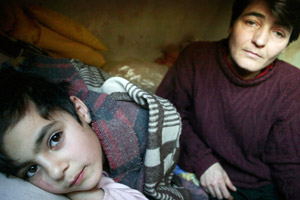Seven year-old Mary hugged her mother’s neck and said kissing her: “She is my mom”. She had a piece of bread in her right hand with sugar in it. Their neighbors had given them this, because they knew that Mary liked sugar very much.
A shine appeared in the eyes of 37 years old Tamara Santrosyan. Then she said: “Yes my baby, go play over there”.
Tamara and her daughter Mary live in a dormitory room (12 s.m.) with old walls, where they can reach from one wall to another just by making a couple of steps forward. Tamara did her best to make the room tidy: the yellow sheet on the bed in their room is the most beautiful thing in their room. They also have two chairs, an old shelf, a small table and a TV set. Mary is the only joy in Tamara’s life. Tamara grew up in an orphanage and as she says, she is in need of hunger and in need of love. “I am ashamed to say that we used to even steal bread. They used to leave us hungry and we knew that they were taking the bread to their places, that is why we stole bread and ate it in the lavatory”.
She left the orphanage when she was 15. She was provided with a dormitory room. Then she got married in 1998. She left the room to live with her husband in his place. But Tamara’s happiness didn’t last long. She was pregnant when her mother-in-law found out that she had grown up in an orphanage.
“She told Harut: “Why did you bring this orphan here? We don’t need her””, says Tamara. And they kicked Tamara out. “She sent some money with his son to give me to go along with abortion, but I would never do that”.
Tamara was hungry and homeless. Mary was six months old when her mother took her to an orphanage. She couldn’t believe that she could do what she had felt herself.
“I left my child there on the base of a contract stating that I was going to take her back in one year. I hoped to get a room during that period. I met a poor woman like me in the 9th district of Yerevan, who lived in a boutique. She was taking care of gardens there. I lived with her until I found my room”, says Tamara in a trembling voice. Later she took Mary back. She received 6.000 dram support and sometimes people called her to clean their apartments. “I was taking Mary with me when going to clean apartments. Where could I leave her? We could hardly survive.”
“We lost a lot because of that man. I don’t mean just the 9.500 dram that I used to receive, but other privileges too. My child had to receive 20.000 dram aid for going to school for the first time, but we haven’t received it either. I could hardly make her go to school. Although she is a child but she understands that it is a shame to go to school with torn, old shoes”.
The money Tamara earns is hardly enough to pay for their transportation expenses and for food. Every day, besides Sundays, she spends 200 dram to go to work. She cleans the entrances of three buildings in Arabkir community. The payment for electricity covers 600-700 drams per month, as for winter, it covers about 4.000 dram.
“I haven’t bought any shoes and clothes for my children yet, she wears the clothes that other people give us. Everything that we have here is given by other people too, because I am not able to buy these kinds of things. My money is hardly enough for bread and some other things to eat”.
“I used to weave with a needle very well. Once I was even given a prize, they gave me 25 rubles, but now I don’t see well and I can’t hold a needle”.
She has gone through an eye operation for both eyes. She has another throat sickness which causes pains in her throat and the eyes in evenings. She had been suggested to be operated on but she can’t go to the hospital: “I am afraid to go to the hospital. What will I do if they tell me that my eyes are not well and I have to operate my eyes too? Where will I get money for this?”.
Tamara very often gets bread as a loan from the shop not far from their place.
“It was Mary’s birthday on November 24”, says their neighbor, “Mary was asking her mother whether or not she was going to make a cake and buy presents for her. But this day passed as usual too, because they had no money”. Tamara knows that getting presents on birthday means to have relatives, to have a childhood, that is why she was very sad that day because she wasn’t able to buy anything for her child. But anyway she thinks that Mary’s childhood is happier than her childhood was. “You can’t compare my childhood with her childhood”, says Tamara, “Mary has a mother that backs her as much as she can. But what were we? Everyone hit us. No, you can never compare. When I hug my child at nights it seems to me that all the problems are solved and there is no problem any more. Though we have many sad days, but we are not alone: Mary has me and I have her”.

